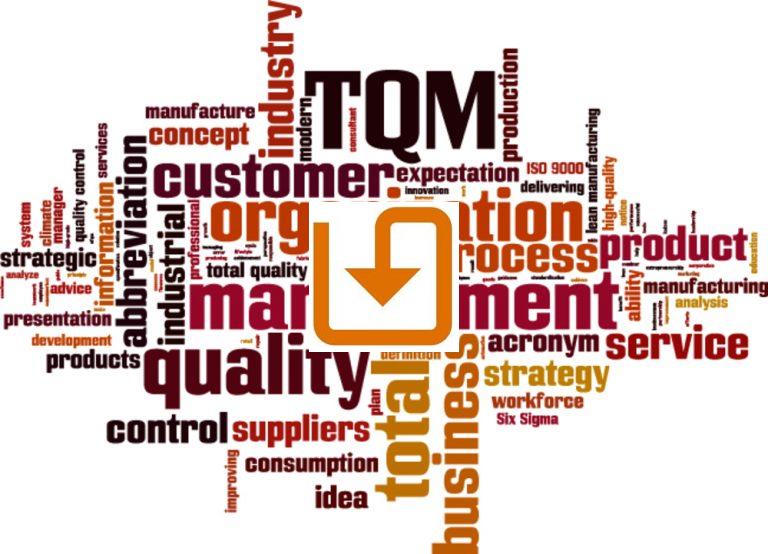TQM Consultant in India

Total Quality Management (TQM) is a complete administration system that aims to improve the quality of outcomes and benefits through ongoing improvements and enhancements. It involves a mindset and training principle required for a continually improving organisation, focusing on customer satisfaction, employee involvement, and process improvement.
TQM in business brings about a cultural change by promoting a work atmosphere where all employees are dedicated to delivering high-quality products and services. This approach highlights the importance of leadership, teamwork, and open communication for continuous improvement and innovation.
Executing TQM often shows increased productivity, as it enables the efficient use of resources and the elimination of unuseful resources. By focusing on quality at every stage of the production process, TQM consultants in Mumbai, India, seek to reduce flaws and mistakes, eventually resulting in improved efficiency and output.
Further, TQM aims to lower operations costs by recognising and managing inefficiencies, enhancing operations, and controlling flaws. This bold strategy to quality management helps organisations minimise rework, waste, and associated costs, showing overall cost savings and improved financial performance.
TOOLS AND TECHNIQUES TO IMPLEMENT THE TQM PRINCIPLES
Tools and techniques of TQM methodology are:
Quality function deployment:
It is a planning tool to define the customers’ voice and fulfill their expectations. QFD can translate a customer’s expectations of engineering and technical characteristics and then put the appropriate directions and actions to meet them through product planning, part development, process planning, production planning, and after-sales services.
Quality management system:
It is a structured method of deciding all the department’s roles and responsibilities to establish continuous improvement.
A regular review process with all stakeholders and an appreciation for where new practices have been introduced are essential steps that should be conducted in every collaborative business model.
Benchmarking:
It systematically analyzes a company’s quality measures and customer-oriented parameters against best industry practices. It encourages better performance from a team by providing a framework.
Statistical Process Control (SPC):
Statistical Process Control is a set of techniques to study a particular process, understand its trend concerning quality and capacity, and take appropriate measures to control or reduce any deviation that might creep in.
The concept of TQM Six Sigma is so effective that it shapes productivity, profitability, and sustainability across almost all industries.
PRINCIPLES AND PRACTICES – TQM SIX SIGMA
1. A committed and proactive management at all levels of the organization to provide top-to-bottom support keeping in mind the long-term goals.
2. A customer-focused approach- an inherent commitment to internal and external customers.
3. Culture of a highly engaged workforce.
4. Never-ending improvements in business and manufacturing processes.
5. Consider vendors as partners in your business and make beneficial decisions for both.
6. Use statistical analysis to establish performance measures for the processes.
One of the essential concepts of Total Quality Management Six Sigma is to have an unwavering focus on all the internal and external customers linked with the process.
Before the TQM era, different departments in a company operated as separate autonomous entities, and they were always focused on short-term goals and were unwilling to link with the other ones. However, Total Quality Management Six Sigma focuses on clubbing them for a customer-focused and performance-oriented common goal.
Another important concept of Total Quality Management Six Sigma is defining and establishing performance measures for each functional area, such as uptime, degree of non-conformance, statistical variation in the process, Capability of the process, and preventive maintenance.
Effective leadership, customer satisfaction, employee involvement, and supplier partnership are the key pillars on which the principles of TQM grow
Frequently Asked Questions
a. Total Quality Management (TQM) is a management approach to long-term success through customer satisfaction.
b. It is a continual process of detecting and reducing or eliminating errors in manufacturing.
c. TQM is an organisation-wide effort that allows companies to fulfil customers’ requirements with minimum or no errors.
d. In a TQM effort, all members of an organization participate in improving processes, products, services, and the culture in which they work.
TQM will bring following key benefits to any organization:
- Strengthened competitive position
- Adaptability to changing or emerging market conditions and to environmental and other government regulations
- Higher productivity
- Enhanced market image
- Elimination of defects and waste
a. Certainly! TQM can be implemented in the right environment for any service sector organization with committed leadership and supportive infrastructure, which would drive C-SAT, E-SAT, loyalty, increased profitability and shareholder values.
b. There are 8 pillars of TQM. Each strive to ensure one provides highest quality at minimal defect and with consistent performance. These tenets are true to both services and manufacturing sectors.
a. The time it takes to implement TQM varies depending on the company.
b. However, it is estimated that most companies can realize a 50 percent improvement in reduction of internal and external rejections along with significant improvement in capacity utilization within 18 months of adopting TQM principles.
a. TQM is distinctive in its inclusive nature, requiring active participation from every level within the organization.
b. This means that everyone from the CEO to entry-level employees is involved in the process of identifying areas for improvement, suggesting changes, and implementing solutions that enhance the quality of the organization’s output.
c. All employees across all functions will be involved in achieving quality excellence. TQM fosters a culture of ingrained quality, teamwork, proactive problem-solving, and commitment to excellence.
REQUEST A
CALL BACK
Please fill the form and click the submit button. We will get back to you in 1-2 business days.





